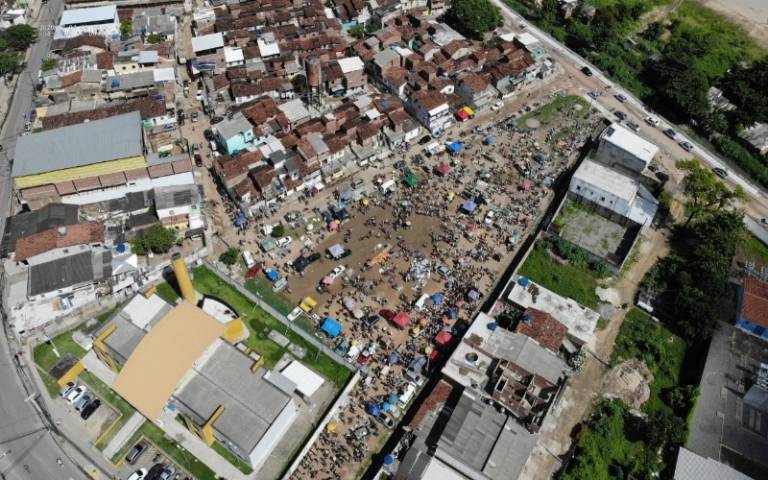Helping track and reduce COVID-19 infections in Northeast Brazil
21 July 2020
A series of innovative coronavirus research initiatives are being carried out by UCL and scientists in Brazil

As part of an ongoing research collaboration, Professor Patty Kostkova (UCL IRDR Centre for Digital Public Health in Emergencies) has teamed up with Professors Jones Albuquerque, Wellington dos Santos and Abel da Silva Filho from the Federal University of Pernambuco (UFPE), Brazil, to help model the spread of COVID-19 in the state of Pernambuco.
In addition, Emeritus Professor Jim Owen and Professor David Abraham (both UCL Medicine) are building on a research partnership with the UFPE’s Laboratório de Imunopatologia Keizo Asami (LIKA), which dates back decades. They will be looking at how COVID-19 affects patients with existing liver and kidney diseases.
Modelling the spread of COVID-19 in Pernambuco
Working with scientists at Pernambuco Institute for Risk & Disaster Reduction (IRRD-PE) and the COVID SGIS initiative, which are affiliated to UFPE, they have developed sophisticated prediction and mapping tools using AI machine-learning which, combined with thermal drone imaging and COVID-infection hospital data, is enabling the team to predict where the virus will spread next. This information gives early warning to public health authorities and local communities.
To accomplish this goal the IRRD-PE cooperates closely with the Pernambuco State Government and the state capital’s City of Recife Council.
Professor Kostkova, who is formally advising the IRRD-PE, has been working with the UFPE on developing early-warning tools, using mobile surveillance technology, to predict the movements and dynamics of mosquito populations in Northeast Brazil in order to combat Zika virus.
“Our specific objective is to ensure that all data from geolocation mapping, mass gatherings estimates from thermal drone cameras, and lab confirmed cases of COVID-19 infection, are effectively used in almost real-time,” she said.
“Through spatial-temporal modelling, we generate predictions for COVID-19 cases for upcoming days with high accuracy.
“Such heat maps are produced for all Brazilian federal states based on both official and collaborative informal data. Importantly, the COVID-19 data generated are posted daily on the IRRD-PE website and help guide optimal strategies to save lives.”
The current number of confirmed COVID-19 cases in Brazil is over 1.6 million, only the USA has more with over 3 million cases, while the UK has around 285,000 cases.
According to researchers the unique modelling tool they have developed is rapidly gaining international recognition.
Professor Kostkova added: “This data-driven spatial-temporal model gave significant early warning signs to public health authorities a week before the actual growth in confirmed case numbers. Indeed, this innovative prediction model using machine learning and mathematical modelling combining heterogeneous datasets is expected to inform potential future pandemics, or indeed aid prediction of a second COVID-19 wave. Data science plays an important role for early warning but cannot replace traditional public health response: consistent public health messaging, testing, contact tracing and isolation’, Prof Kostkova concluded.
In Brazil, the state of Pernambuco is regularly ranked as having the best surveillance data as assessed by Open Knowledge Brasil. And using the IRRD-PE’s and COVID SGIS tracking of COVID-19 infection it has been established that the infection hot spots are along the route of the BR-232 federal highway in Pernambuco. This has enabled the virus to spread rapidly from the state capital Recife, with its international airport and urban area of 4 million, into the small- and medium-sized cities of Pernambuco state.
Professor Albuquerque, who was a visiting research scientist at UCL from 2017 to 2018, said: “Modelling the epidemiological dynamics of COVID-19 is completely new for everyone. Our long term partnership with UCL Medical School and UCL IRDR Centre for Digital Public Health in Emergencies was essential to create an epidemiological surveillance platform helping Brazil (irrd.org/covid-19)."
Public health messaging
In Brazil, public health policies and initiatives are conducted at a state level and researchers say these policies and priorities often differ significantly from the national government – the Federal Government of Brazil.
With this in mind, Professor Kostkova and colleagues in UCL IRDR Centre for Digital Public Health in Emergencies, are working with UFPE, on a study looking at social media analytics of Twitter messages by public health authorities and the government in Brazil.
She said: “The aim is to better understand the level of COVID-19 misinformation within Brazil, in part arising from confusing or conflicting policies sanctioned by the Federal Government and the President.”
In addition, to support the Pernambuco State Government, Professor Kostkova and Emeritus Professor Jim Owen have recorded public health videos, which have been broadcast throughout the state. University scientists in Brazil are highly regarded across the different cultures, so external expert voices supporting COVID-19 health messaging, was designed to strengthen the state’s lockdown strategy.
Liver and kidney research
The third UCL-Northeast Brazil COVID-19 collaboration is a broader network between UCL Division of Medicine, UFPE, the Federal University of Ceará, Fortaleza (UFC) and University of Udine, Italy.
Researchers are assessing the impact of COVID-19 on patients with pre-existing liver disease and also on haemodialysis patients. The aim is to identify genetic factors and biomarkers, plus understand the inflammatory processes, that determine patient outcomes.
Professor Owen said: “Though COVID-19 studies in liver disease might seem offbeat, the early impression of clinical hepatologists at UCL is that these patients actually resist infection and respond well to treatments.
“Understanding the likely stronger immune response from jaundiced patients that fights COVID-19 may well give clues to improved therapy for all patients.”
Further information
- Professor Patty Kostkova’s academic profile
- Emeritus Professor Jim Owen’s academic profile
- Professor David Abraham’s academic profile
- Professor Jones Albuquerque’s academic profile
- Federal University of Pernambuco
- Pernambuco Institute for Risk & Disaster Reduction
- Laboratório de Imunopatologia Keizo Asami
Image
Drone footage above a market in Pernambuco, credit Professor Jones Albuquerque
Media Contact
Henry Killworth
Tel: +44 (0) 7881 833274
E: h.killworth@ucl.ac.uk
For the latest news about UCL’s international activity, partnerships and opportunities, subscribe to our bimonthly Global Update newsletter.
 Close
Close

